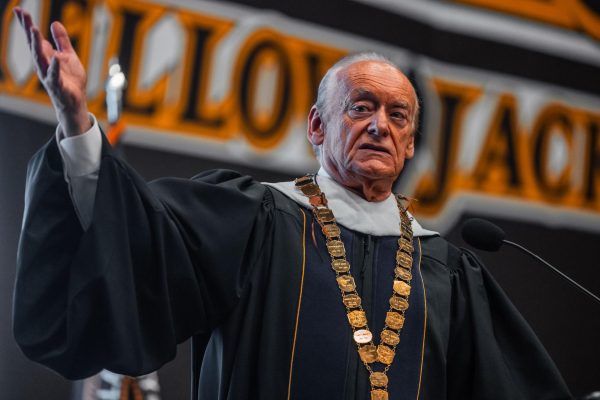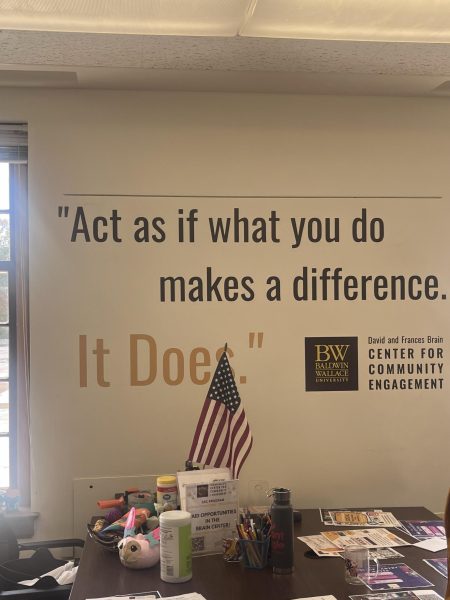Dance students collaborate with Spanish professor to share story of indigenous women in Ecuador
Based on the research of BW associate professor of Spanish Karen Barahona, “fyoo zh en ’23: Sumagsisa, Beautiful Flower” showcases themes of nature, gender equality and empowerment.
Baldwin Wallace’s yearly dance concert “fyoo zh en” brings cultural appreciation to Kleist’s Mainstage Theatre from Feb. 22 to Feb. 25, sharing the story of a group of indigenous women from Ecuador.
“Fyoo zh en” is BW Dance’s annual partnership with a BW professor, in which the cast and creatives translate the professor’s research into movement. This performance is directed by Assistant Professor of dance Sara Whale, who has been collaborating with and mentoring student choreographers throughout the rehearsal process.
“We found that this is really a valuable way for our artists to learn how to create art out of current events and make meaningful work,” Whale said. “It’s not just about entertainment, but they’re actually having to dig a little bit deeper.”
This year’s concert “fyoo zh en ’23: Sumagsisa, Beautiful Flower,” explores the research of Karen Barahona, associate professor of Spanish, who traveled to Ecuador through the BW-Universidad del Azuay faculty research exchange program in 2019. One aspect of Barahona’s research focuses on community-based tourism.
According to a written note sheet provided to The Exponent by Barahona, community-based tourism is “the relationship of the community with its visitors in the development of organized travels to guarantee the adequate management of natural resources and the appreciation of cultural heritage, communities, and territories for equitable distribution of benefits generated.”
As a part of this research, Barahona said that she visited the Chilcatotora community and interviewed eight indigenous women who had established Sumagsisa, a touristic center where visitors are taught the culture of these indigenous people.
“As a tourist, you come to their center, and they teach you your culture,” Barahona said. “They want to preserve their cultural heritage.”
Senior arts management and entrepreneurship student Leslie Bell, who was one of the choreographers for this concert, said that many of the themes represented in the dance pieces are abstract and draw inspiration from the research provided by Barahona and testimonials provided by the women of Sumagsisa.
“We have recordings that we’re incorporating into our dance, and within the program, you’ll see the translations,” Bell said. “From there, you’ll see the movement that correlates with that.”
According to a statement shared by Barahona, “Their testimonies share about their involvement in tourism, as well as universal themes we all can relate to and be reminded of, like maternity, preservation of planet earth, women’s empowerment, and gender equality.”
The choreographers of “Sumagsisa, Beautiful Flower” approached the research by creating movement that related to each of these themes, and Bell said that she focused on the “idea of being grounded and being surrounded by nature.”
Participating in “fyoo zh en” is an opportunity for students to be involved in a dance project that spans across majors. Senior music theatre major Savannah Cooper said that this challenging experience has been an amazing opportunity for her to meet new people.
“I’m a senior and I’ve never participated in one of the dance concerts like ‘fyoo zh en’ before, so I really wanted to just push myself this year and try something kind of out of the box,” Cooper said. “And this allowed me to experience a whole new rehearsal process.”
To promote cultural appreciation rather than appropriation, Whale said that the cast and creatives worked in tandem with Barahona and operated with permission from the women of Sumagsisa in making sure the movement, costumes and music honors the culture, not imitates it.
“They have given us permission to create this work, which is really exciting,” Whale said. “I think one of the things I was most concerned about when we started working [was] … cultural appropriation and how do we do this without offending [anyone].”
Whale said that they were able to honor the Ecuadorian culture by incorporating traditional dance forms, like the tango, and limiting the music to regional samplings, including music by some new Ecuadorian composers.
Cooper said that she was particularly drawn to this production because she was inspired by the story of these women who made an “opportunity for themselves” and are “empowered by it.”
“I’m someone who thinks it’s important to take whatever platform you have within your own community … and uplift people that don’t have that privilege,” Cooper said. “So being able to … share these women’s stories through art is very important, and I think it’s a very unique opportunity that we have and shouldn’t be taken lightly.”
Barahona presented her research on Feb. 14 in the Center for Innovation and Growth and an exhibit will be open during the production’s run in the lobby of the Kleist Center for Art & Drama.
“Sumagsisa, Beautiful Flower” will run Feb. 22-25 with all performances at 7:30 pm, and a Q&A session with Barahona will follow the performance on Feb. 24. Tickets are free for students and can be reserved or purchased here.
The Exponent is looking for financial contributions to support our staff and our newsroom in producing high-quality, well-reported and accurate journalism. Thank you for taking the time to consider supporting our student journalists.


































